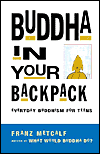
What Does Buddhism Teach? - Don't worry, I won't give you a history of Buddhism. There are many dull accounts of this history and a few not-so-dull ones — check out the books and web sites I recommend For now, let's get right to the living center of Buddhism: what the Buddha saw, felt, and taught to his disciples.
What the Buddha saw, felt, and taught to his disciples.
We'll also look at the continued growth of Buddhist ideas beyond what the Buddha himself taught, for wisdom didn't stop when the Buddha passed into final nirvana. Not at all. When humans really get something and then really strive to teach it, sometimes the student goes beyond the teacher. As a teacher, I know this happens all the time. There's a Zen saying that any teacher whose students don't surpass him is a failure. The Buddha was not a failure. As we'll see, his teachings have grown and deepened — and are still doing so.
Buddhism teaches an end to pain, frustration, disappointment, and suffering
He set out to make an end to the pain, frustration, disappointment, and suffering of life. Buddhism teaches that he finally did make an end to those things, but not in the obvious way of ending the worldly causes of these troubles. No one can put an end to them, not even a Buddha, not even a god. They are inseparable from the things that cause pleasure and joy; they are woven into the fabric of the universe. There is no life without death, no love without loss. As a "take-no-prisoners" Buddhist text puts it:
Everything together falls apart.
Everything rising up collapses.
Every meeting ends in parting.
Every life ends in death.
-- U DANAVARGA
Any person who cares about the world and other people tries to put things together, to build up what is collapsing, to postpone parting, and to avoid death. These efforts make life meaningful and beautiful. But every person who has a brain knows no amount of trying will ever finally prevent things from falling apart, collapsing, parting, and dying. We're all subject to the laws of physics, including the second law of thermodynamics that says that energy tends to flow from concentration to diffusion. As the Buddha put it, "All component things decay." In other words, over time, any complex system, such as our complex bodies, created from millions of energy transfers, will break down, come apart, and fall to ruin. There's no stopping it.
Buddhism teaches whatever we cherish, we shall lose
Buddhism teaches a terrible truth. Whatever we cherish, we shall lose, and there's simply nothing we can do about it. This may sound profoundly depressing at first, but it's not. It's simply the truth. It's what we all know already but don't always want to examine. It's what the Buddha saw when he left the palace. It's reality. The question is: What do we do about it?
The need to act now is the central insight for those of us who aren't sure what to believe about the afterlife or our eternal souls (if we have them). It is perhaps the most important thing that can be written in this or any book: Whatever we believe about the great issues of life and death, we have to act now, in this very moment.
In Buddhism history comes down to right now
 The immense cosmos comes down to right here. The whole history of time comes down to right now. Terrible endings will come, yes, but that makes no difference at all right now. What matters right now still matters, right now. Think, feel, and act in this moment, responding honestly to each experience. This is life and what we make of it.
The immense cosmos comes down to right here. The whole history of time comes down to right now. Terrible endings will come, yes, but that makes no difference at all right now. What matters right now still matters, right now. Think, feel, and act in this moment, responding honestly to each experience. This is life and what we make of it.
You can use up a lot of energy trying to break the second law of thermodynamics, but that's not going to get the job done. You can't break the laws of physics.
Okay, then ... what can we do? Just lay down and die right now? No, very few people try that. The Buddha certainly didn't. In spite of everything, we find life sweet and want more of it. There's a trick almost all of us use: we pretend that we can break the law, stop time and decay, keep things just right all our lives, and live forever.
We know this is a lie but we love to do it anyway. Amazingly, we somehow manage to ignore the feebleness of this pretense almost all the time. We lull ourselves into dreams of amusement and hope. When people are successful at pretending, they sometimes become happy, but of course it can never last. When times of real decay and loss come, pretending fails and they have to face reality without preparation or practice. You've probably witnessed examples of this; they are obvious and painful. It's pretty clear that, over the long run, this trick just doesn't work.
But not everyone resorts to tricks. Not everyone needs to pretend. When he realized the whole world around him was pretending, Siddhartha left home to find something real. Other spiritual seekers have done this since the beginning of humanity and still do it today. After they discover life beyond dreaming, some return and invite us to wake up, too. Siddhartha was not the first Buddha. There have been many and there will be more to come. Buddhism has always taught this.
Buddha found a way to end trouble
The Buddha found a way to end trouble by waking up to what really causes it. He saw a third option that would keep working even while everything falls apart. Not impossible efforts to stop the process. Not doomed efforts to deny it. Instead, he saw before him the liberating path of accepting it. He recognized the truth of impermanence and made it the cornerstone of Buddhism.
Impermanence is all around. As one teen wrote,
"I've got this huge feeling of sadness that everything I have will go one day. I was looking at all the things in my room and thinking that one day I won't have this room and the things in it. I was also looking at photos in my album and feeling sad because I know my whole family will change. People will die, we'll move on, and it won't be the same. I end up thinking it would be better for me not to have so much stuff because the pain of losing it will be so great. I guess this is exactly what the Buddha was talking about: attachment. This is dukkha, so I must focus on non-attachment. Then I might be able to accept the impermanence of things...
The Buddha accepted impermanence openly. He could do this because he saw what it really meant. And this brings us to the astounding truth at the core of awakening.
Buddha's truth is unsuspected
The Buddha's truth is astounding not because it's complex or brilliant. It's astounding because it's so unsuspected, yet follows so directly from the idea of impermanence we've just been talking about. Here it is:
There's no enduring self that suffers.
That's it. Simple. Astounding. Maybe we should pause here. Yes, stop reading for just a minute and sit with that idea. Shut your eyes and breathe in and out, slowly, easily, for just a minute as you let it sink into you. Go on, mark the page and set the book down. Experience how you feel with that idea. I'll wait.
Okay, welcome back. How did that feel? This is one strange idea, isn't it? We'll get back to it in a moment, but right now let me tell you that you just meditated. Ha! You thought you were just sitting? The great Japanese Zen teacher Dogen Zenji says that "just sitting" is the highest form of meditation. Congratulations. Nothing to it. (In several ways.)
Reprinted with permission of the publisher,
Ulysses Press. ©2003. www.ulyssespress.com
Article Source
Buddha In Your Backpack: Everyday Buddhism for Teens
by Franz Metcalf.

A guide for navigating the teen years, Buddha in Your Backpack is for young people who want to learn more about Buddhism or for those who simply want to understand what’s going on inside themselves and in the world around them. Buddha in Your Backpack tells Buddha’s life story in a fashion teens will relate to, describing Buddha as a young rebel not satisfied with the answers of his elders. It then introduces Buddha’s core teachings with chapters like “All About Me” and “Been There, Why’d I Do That?” The author presents thoughtful and spiritual insights on school, dating, hanging out, jobs, and other issues of special interest to teens — inviting readers to look inside themselves for answers.
Info/Order this book. Also available as a Kindle edition.
About the Author
 Franz Metcalf did his Masters work at the Graduate Theological Union, and received his doctorate from the University of Chicago with a dissertation on the question, "Why Do Americans Practice Zen Buddhism?" He currently works with the Forge Institute for Spirituality and Social Change, co-chairs the steering committee of the Person, Culture, and Religion Group of the American Academy of Religion, and teaches college in Los Angeles. He has contributed reviews and chapters to various scholarly publications and is review editor of the Journal of Global Buddhism. He's the author of What Would Buddha Do? and co-author of What Would Buddha Do at Work? If you want to learn more about Franz (and other Buddhist things), visit his web site at: www.mind2mind.net
Franz Metcalf did his Masters work at the Graduate Theological Union, and received his doctorate from the University of Chicago with a dissertation on the question, "Why Do Americans Practice Zen Buddhism?" He currently works with the Forge Institute for Spirituality and Social Change, co-chairs the steering committee of the Person, Culture, and Religion Group of the American Academy of Religion, and teaches college in Los Angeles. He has contributed reviews and chapters to various scholarly publications and is review editor of the Journal of Global Buddhism. He's the author of What Would Buddha Do? and co-author of What Would Buddha Do at Work? If you want to learn more about Franz (and other Buddhist things), visit his web site at: www.mind2mind.net


























